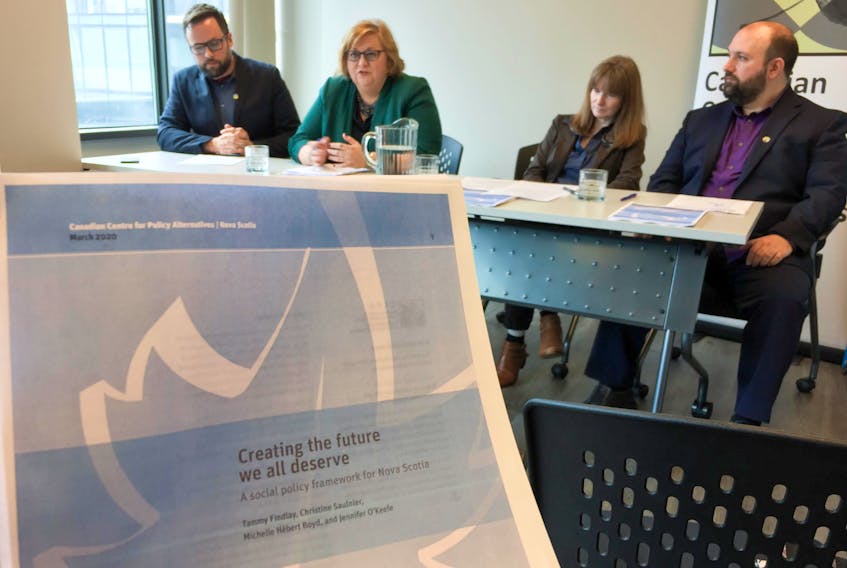A new report calls for a fundamental rethinking of social policy and a paradigm shift in how governments can ensure no one is being left out through inequality.
The Nova Scotia College of Social Workers partnered with the Nova Scotia branch of the Canadian Centre for Policy Alternatives to produce the report, called Creating the Future We All Deserve: A social policy framework for Nova Scotia.
It was authored by Tammy Findlay, associate professor and chair of political and Canadian studies at Mount Saint Vincent University; Michelle Hebert Boyd, a social policy consultant, Jennifer O’Keefe, who works in the non-profit sector in K’jipuktuk; and Christine Saulnier, Nova Scotia director of the CCPA.
Findlay and Saulnier, together with NSCSW president Ezra Wexler and executive director Alec Stratford, held a news conference on Wednesday at the NSCSW office in Halifax to launch the report.
Saulnier told those attending and watching online that Nova Scotia has the markings of a province that is not thriving for many.
“We have one of the lowest wages in the country, some of the lowest household incomes, high poverty rates and the lack of access to public services that we need, as well as a weakened democracy,” she said.
“It’s clear that many people in our province do not have the means and the opportunity to fulfil their potential and participate as full and equal members of our society while a small minority continuously prosper. ”
The new policy framework offers a comprehensive analysis of the roots of income inequality as well as its consequences.
“Income inequality really is a concern because it undermines who we are as a society,” Saulnier said. “It breaks the bonds we have.
“We pit those who have little against those who have less. We begin turning inward. We begin protecting the little crumbs while somebody else runs away with the cake.”
The goal of the report is to offer a roadmap for transformative change to benefit more of those who are not seeing economic prosperity now, the authors said.
Findlay described 10 guiding principles the report suggests should be applied to the development of all social policies. Those include: interconnectedness, decolonization, social inclusion, universality, climate justice, decent work and well-being, public provision, fiscal fairness, shared governance, and democratization.
She said all levels of government have some role to play in making this a reality.
“I think the most important part is actually working with communities,” Findlay said. “One of the principles we talk about is democratization and it’s important for other voices to be heard when we are making public policy. That’s part of the reason why we now have policy that doesn’t work for lots of people, because those voices are not included in the conversations. I think the first step would be for governments at all levels to actively seek out those voices that have been excluded and asking them what they need.”
Stratford, who is also the registrar of the NSCSW, said the overarching theme of the report is that inequality hurts us all but we have the tools to fix it and they should be embraced.
“We saw a provincial budget recently passed that saw a two per cent corporate tax break – a policy change that we know is going to have absolutely zero impact on the most vulnerable and marginalized in our society,” he said. “Those decisions are influenced by a few elite folks who substantially benefit from that. We have a premier and a government that continues to believe in the benefits of a trickle-down economy. It’s never trickled down. And to correct that, we have to have public policy that is aimed directly at the harms that we currently see out there. And it cannot be done by the private market.”
The next step will be holding workshops on the framework across the province over the next few years on how to use the framework, as well as holding governments accountable for their decisions, Stratford said.








